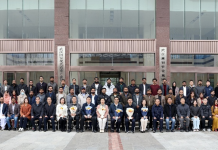The 19th Asian Games, or Asiad, a jamboree in the form of sporting events, are unfolding in Hangzhou, capital of Zhejiang Province in east China, from September 23 to October 8, providing a platform for the intermingling of Asian civilizations, and in turn promoting solidarity and cooperation across Asia.
Civilization is the achievement of social development, combining material, cultural and intellectual wealth. Asia is a cradle of human civilization with several prominent ancient cultures such as China, India and Babylonia calling it home. Today, over 4 billion people scattered across more than 40 countries and territories in about 1,000 ethnic groups speaking some 100 languages make up Asia’s big family.
Their ancestors first began exchanging goods and interacting with each other in ancient times. The silks, teas, pottery, spices, paintings and carvings of the ancient Silk Road bear witness to these earliest of cultural interactions. Sport, too, plays an important role as demonstrated at the 19th edition of the Asiad where peoples of Asian countries are once again united by an athletic bond. Most importantly: Friendship comes first; competition comes second.
Competition results are only one part of the Asian Games, while forging friendly ties is a primary objective both inside and outside the stadiums. After all, lifting cultural exchange can help eliminate misunderstandings and narrow gaps in people’s values, thus cementing their bonds.
When addressing a welcoming banquet in Hangzhou on September 23, President Xi Jinping said the Asian Games embody the Asian people’s shared desire for peace, unity and inclusiveness. “We should use sports to promote inclusiveness, enhance confidence in our civilizations, pursue exchanges and mutual learning, and renew the glory of Asian civilizations,” he said.
Asia today enjoys a much more peaceful environment for development than before. For example, thanks to China’s mediation efforts, Iran and Saudi Arabia in early March resumed diplomatic relations after years of tensions. People-to-people and trade exchanges across the continent are on the rise, with the Belt and Road Initiative, a China-proposed initiative to improve connectivity along and beyond the ancient Silk Road routes, providing a platform for pan-Asian cooperation.
What’s more, the Asian Games are sparing no effort to showcase the green and smart side of civilizational development. From smart light poles around the venue, the 5G mobile network covering all venues, new-energy vehicle charging piles and Internet of Things-powered equipment, to 4K ultra-high-definition broadcasting, driverless shuttle services plus unmanned delivery logistics, all reflect the achievements of modern scientific and technological progress.
Carrying forward the vision of “green, smart, economical and ethical,” this Asiad edition features many firsts: the first official digital viewing app that offers wide-ranging services, the first digital torchbearer (a digital platform where people can pass the torch by shaking their smartphones), and the first time for international participants to have access to China’s mobile payment services. Hangzhou houses the headquarters of e-commerce and Internet giant Alibaba. All in all, the event has been presented as the most digital Asian Games ever by incorporating cutting-edge technologies.
The green and intelligent example set by the 19th Asian Games will promote the application of such achievements to economic and social development throughout Asia—and the world at large.
In the era of economic globalization, cultural diversification and widespread digitalization, which are accompanied by increasing uncertainty in the international situation, humanity is forced to face up to serious global challenges.
The 19th Asiad addresses our differences in the spirit of equality, inclusiveness and friendship, through mutual learning. Sports here embody humanity’s common values, which will surely contribute to overcoming the challenges we, the people of the world, must tackle today. To survive and thrive, humanity must stay on the ball. –The Daily Mail-Beijing Review news exchange item






